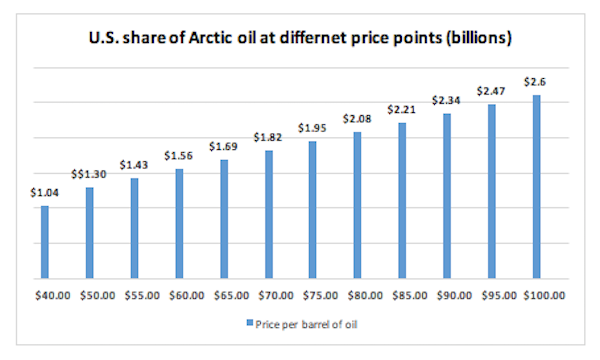Research
March 17, 2016
Obama’s Arctic Flip-Flop: U.S. Interests in the Arctic
The Department of Interior released a proposal yesterday to make the Arctic and the Atlantic completely off limits for oil and gas drilling until 2022. This surprising U-turn comes only 8 months after the president gave the green light for Arctic exploration. But it is also only days after Canadian Prime Minister Trudeau’s visit to the White House, where the future of the Arctic was a main topic of conversation. This plan sets back the U.S. and its ally to the north, and makes North America weak on the global stage in terms of resource development and defense.
The plan released Tuesday consisted of options, including the consideration of a single lease sale in the Chuckchi Sea, Beaufort Sea and Cook Inlet, as well as an option that (according to the Alaska Dispatch) “includes no new leasing.”
According to the Guardian “Under an earlier draft of the proposal the Interior Department would offer the first Atlantic leases in 2021. The first exploratory drilling could take place within three to five years. If the companies did make a discovery it would take about a decade to move to oil and gas production.” The United States does not have 15 plus years to wait, the time to act is now.
Past Policy
On July 22, 2015 Shell was given the green light by the Bureau of Safety and Environmental Enforcement to drill in Alaska. The Bureau issued Shell two Applications for Permit to Drill (APDs). The initial drilling took place in the Chukchi Sea. However, after a host of different obstacles arose – including failed equipment, significant regulations on permits and a steep drop in the price of oil – Shell announced a cessation on the project “for the foreseeable future.”
Arctic potential
While no one, including Shell, knows exactly how much oil and natural gas is in the Chukchi, the US Geological Survey estimates that the Arctic is home to nearly 30 percent of the world’s undiscovered natural gas, which includes 13 percent oil and 22 percent of natural gas liquids. According to Shell, this amounted to around 400 billion barrels of oil equivalent, or 10 times the total oil and gas produced in the North Sea to date.
The Prize
At today’s price of oil hovering around $38.00, the estimated 26.21 billion barrels of oil would still amount to just under a trillion dollars. Coupled with the potential 131.45 trillion cubic feet of natural gas, it would allow the U.S. to play an even more dominant role on the global oil and gas market.
The following chart illustrates the gross revenue that could be realized from Arctic oil at different price points.

The Arctic Players
The U.S is not the only country with an interest in the Arctic; countries including Russia, China, Canada, Denmark and Norway also have their eyes on the prize. According to a previous American Action Forum report, “Although Russia holds a large claim over these [Arctic] resources as a result of its vast Arctic coastline, the U.S. Department of the Interior’s Bureau of Ocean Energy Management estimates that Alaska’s outer continental shelf contains 26.21 billion barrels of undiscovered oil and 131.45 trillion cubic feet of undiscovered natural gas.”
According to the same American Action Forum report cited above, “of all the Arctic nations, Russia undoubtedly maintains the largest Arctic military infrastructure…. this buildup is meant to assist Russia in securing its claims to the Arctic’s vast natural resources and potentially lucrative shipping routes.” This is a scenario that the U.S. cannot allow. Russia has become a dominant player in the quest for the Arctic and it is time we asserted strategic strength.
Conclusion
The ObamaAdministration is putting a stranglehold on the potential that the Arctic possesses. The press release from the Department of the Interior stated “We know the Arctic is a unique place of critical importance to many – including Alaska Natives who rely on the ocean for subsistence.” While this is true, the Department and the Administration are severely undervaluing the critical, strategic advantages the Arctic provides. The U.S. cannot sit idly by while countries such as Russia and China assert their dominance over Arctic resources that will create domestic jobs and enhance the United States’ global, economic, and strategic footprint.










